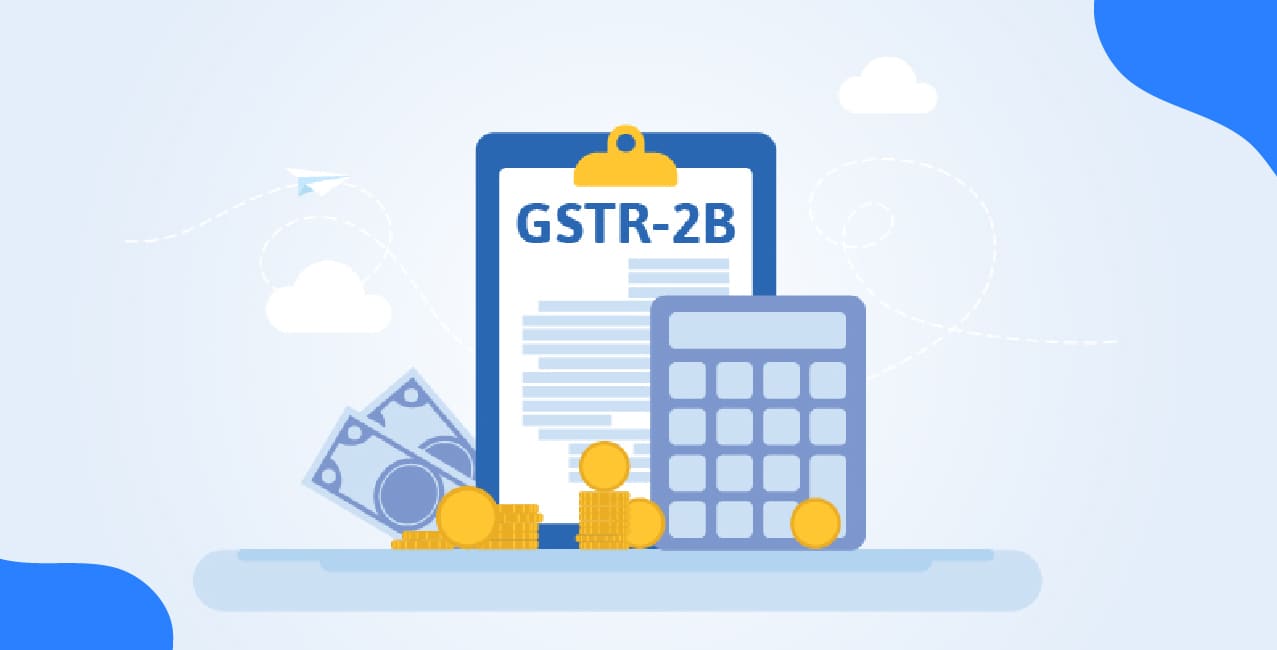GST on Rent: Complete Guide to Rates & Applicability

Check Your Loan Eligibility Now
By continuing, you agree to LoansJagat's Credit Report Terms of Use, Terms and Conditions, Privacy Policy, and authorize contact via Call, SMS, Email, or WhatsApp
Key Takeaways:
- GST on Rent is now the tenant’s responsibility if the landlord is not registered under GST. This is done under the Reverse Charge Mechanism (RCM), which puts legal and financial responsibility on the tenant.
- The GST rate remains 18%, and it must be paid every month. This is over and above the rent amount, increasing total rental expenses significantly for businesses.
- Input Tax Credit (ITC) is now disallowed for most commercial leases, which means the tax you pay on rent cannot be adjusted against the GST you collect. This change hits MSMEs, traders, and professionals the hardest.
- Tenants must file GSTR-3B every month, create self-invoices, and keep proper records. Non-compliance attracts 18% interest on the unpaid tax and ₹50 per day penalty for delay in filing.
- Before signing or renewing a rental agreement, always confirm whether your landlord is GST registered, as this will determine who pays the tax and whether RCM applies.
BONUS: SMALL TAXPAYERS CAN NOW BENEFIT FROM A SIMPLIFIED GST COMPLIANCE SYSTEM AIMED AT REDUCING PAPERWORK AND EASING MONTHLY RETURN BURDENS.
GST on Rent is a tax applied to rented commercial properties like shops, offices, and godowns. It is charged at 18%.
Ravi runs a mobile shop in Noida and pays ₹45,000 per month as rent for his shop. Until recently, his landlord handled any GST requirements. But from 2025 onwards, the rules changed. Ravi’s landlord is not registered under GST.
Now, Ravi himself must pay 18% GST on Rent through the Reverse Charge Mechanism. This adds ₹8,100 extra each month, making his total monthly outflow ₹53,100. Since Input Tax Credit is no longer allowed on such rent, Ravi’s business faces higher costs and more paperwork, including self-invoicing and GST return filing every month.
This blog explains everything you need to know about GST on Rent in 2025, its key rules, who it affects, how much it costs, and how tenants and small businesses should respond.
Businesses that use rented shops or offices need to follow GST rules. If the property is for business use, GST at 18% may apply. Residential flats used only for personal living are not taxed. Understanding this basic rule is the first step for anyone running a business on rented space.
Before reading about detailed updates, it is important to understand how GST is applied to different property types used in India:
- GST on Rent is applicable only for commercial and business-use properties.
- The GST rate is fixed at 18%.
- If the landlord is not GST registered, the tenant must pay GST.
- Rent on homes or flats for personal use does not attract GST.
- It applies to shops, clinics, offices, godowns, and even co-working spaces.
These points help tenants clearly identify whether GST on Rent applies to their property or not.
Latest GST Rule Changes in 2025
In 2025, the government updated GST rules related to rented commercial spaces. Now, if the landlord is not GST registered, the tenant must pay 18% GST under the Reverse Charge Mechanism (RCM). Also, Input Tax Credit (ITC), which was earlier allowed in many cases, is now restricted. These two changes have increased the cost and compliance burden for businesses.
Let’s have a look at Priya’s example. She runs a clothing boutique in a rented commercial shop in Bengaluru. Her rent is ₹40,000 every month. Her landlord is not registered for GST.
Due to the 2025 rule change, Priya now pays ₹7,200 (18%) as GST under Reverse Charge. She also cannot claim Input Tax Credit. Her total monthly expense is now ₹47,200, which affects her boutique’s profit margins. Earlier, there was no such GST if the landlord was not registered.
Major Rule Changes in 2025
The following updates explain how the 2025 rules have changed the way GST on Rent works for business tenants.
- If the landlord is not registered under GST, the tenant must pay GST under the Reverse Charge Mechanism.
- Residential rent used only for living is still exempt from GST.
- Input Tax Credit (ITC) is now mostly not allowed on commercial rent payments.
- These changes affect offices, shops, clinics, warehouses, and other business-use spaces.
These rule changes have raised costs for lakhs of small businesses renting commercial properties across India.
Comparison Table: GST on Rent, Old Rules vs 2025 Updates
The table below clearly shows the difference between how GST on Rent was applied earlier and how it works after the 2025 changes:
This table highlights the financial and legal shift from landlord to tenant, increasing both tax liability and paperwork.
GST on Rent and the Reverse Charge Mechanism
When a landlord is not registered under GST, tenants must now pay the tax themselves. This is called the Reverse Charge Mechanism (RCM). Under RCM, the tenant becomes responsible for calculating, paying, and filing GST on Rent. This is a big change for small businesses that previously didn’t deal with GST directly.
For example, Rajeev, a freelance graphic designer, rents a small office in Pune for ₹30,000 per month. His landlord is not GST registered. After the 2025 rule update, Rajeev must pay ₹5,400 (18%) as GST on Rent through RCM.
His total monthly cost becomes ₹35,400. Since the space is for business, he has to self-generate an invoice and report this tax under GSTR-3B every month, even though the landlord does not charge it.
Read More - What is Input Tax Credit? Meaning, Eligibility & How It Works in GST
When Does Reverse Charge Apply for GST on Rent?
The following table explains in simple terms when the Reverse Charge Mechanism is applied to rental payments.
Tenants should always check the landlord’s GST registration status before signing or renewing a rent agreement.
How Does a Tenant Pay GST on Rent via RCM?
Below are the steps a tenant needs to follow when paying GST under the Reverse Charge Mechanism.
- Step 1: Calculate 18% GST on the monthly rent.
- Step 2: Create a self-invoice since the landlord won't issue one.
- Step 3: Pay the GST using the GSTR-3B return for that month.
- Step 4: Keep records and invoice copies for verification.
- Step 5: Repeat the process every month until the lease ends.
Not following these steps can lead to interest, penalties, or GST mismatches during audits.
GST on Residential vs Commercial Rent
The rules for GST on Rent differ depending on how the rented property is used. If a flat is used purely for living, no GST is charged. But if the same flat is used as an office or studio, GST becomes applicable. Understanding this difference is very important for both landlords and tenants to avoid tax problems.
Deva is a wedding photographer and works from a rented flat in Chennai. The rent is ₹25,000/month. Though the flat is residential, Deva uses it as his main workspace.
Under the 2025 rules, Deva must now pay ₹4,500 GST (18%) every month, because the property is being used for business. This wouldn’t apply if he used the space only for living.
GST on Rent for Different Property Uses
The table below shows which types of property uses attract GST and which are exempt under the 2025 rule update.
It is not about the type of building but how you use it that decides whether GST on Rent applies or not.
How Small Businesses Are Affected by GST on Rent?
Small businesses, startups, and professionals are among the most affected by the 2025 rule changes in GST on Rent. Without Input Tax Credit and with the added tax responsibility, their operational expenses increase.
Also Read - GST on Cement – Updated Rate, HSN Code & Guide
Key Ways Small Businesses Are Affected
Let’s understand how the new GST on Rent rules have created financial pressure on small businesses and freelancers.
- Increased Cost: The tenant now has to pay 18% extra every month as GST without any refund option.
- No Input Tax Credit: Businesses can no longer offset this GST against their output tax liability, which was a relief earlier.
- More Compliance: Tenants must now generate self-invoices and file monthly GST returns, adding to administrative work.
- Cash Flow Issues: For businesses running on tight budgets, the additional GST outflow affects profit margins.
This burden makes it essential for small enterprises to plan better and possibly renegotiate rent terms with landlords.
How to Pay GST on Rent: Step-by-Step Process?
Tenants now must take responsibility for paying GST on Rent directly to the government. It is not enough to just transfer rent to the landlord, GST has to be calculated, paid, and reported.
Steps to Pay GST on Rent Properly
The following steps will help any tenant pay GST on Rent correctly and avoid mistakes or penalties.
- Calculate GST: Multiply your rent by 18% to find the GST amount.
- Self-Invoice: Since the landlord isn’t charging GST, create a self-invoice for your records.
- File GSTR-3B: Use this return form to report and pay the tax monthly.
- Keep Records: Maintain copies of invoices and payment receipts for audits.
- Repeat Monthly: Continue this process for every month you are under the rental agreement.
By following these steps regularly, businesses can stay compliant with the law and avoid late fees.
Penalties for Not Paying GST on Rent
Ignoring the new rules under GST on Rent can result in financial penalties. Tenants must treat it like any other tax obligation and follow the timeline strictly.
The table below outlines the penalties a tenant could face if they fail to follow the GST on Rent rules.
These penalties highlight why paying GST on Rent correctly and on time is very important.
Tips to Manage GST on Rent Efficiently
While the new rules add responsibilities, tenants can still manage their finances wisely by making smart decisions around GST on Rent.
Here are some simple tips that can help small businesses handle GST on Rent smoothly and avoid financial stress.
- Negotiate Rent Inclusive of GST: Try to finalise rent amounts that include GST, making it easier to budget.
- Check Landlord’s GST Status: Always confirm whether your landlord is registered or not. This determines who pays the tax.
- Set Reminders for Filing: Use reminders to ensure you don’t miss your monthly GST filings.
- Hire a Consultant if Needed: If you are unsure, taking help from a GST consultant can avoid costly mistakes.
Following these tips can reduce stress and help businesses stay focused on growth instead of paperwork.
Conclusion
The 2025 update to GST on Rent has created new responsibilities for tenants and made commercial renting more expensive. Whether you're running a clinic, shop, design studio, or warehouse, it is now essential to check your landlord's GST status and manage monthly filings.
By following the rules, using self-invoices, and keeping all records, you can avoid penalties and maintain smooth financial operations. For many small businesses, this may also be a good time to consult a tax expert and explore other ways to optimise their rental expenses.
FAQs
1. If my landlord becomes GST-registered during the lease term, do I still need to pay under RCM?
No. Once your landlord is registered under GST and starts charging GST on the rent invoice, you are no longer required to pay under Reverse Charge Mechanism. The responsibility shifts to the landlord.
2. Is GST on Rent applicable if I sublet my rented office space to another business?
Yes. If you sublet the space and charge rent, you may need to register under GST and collect GST from your sub-tenant, depending on your total annual turnover. This can complicate tax reporting.
3. Can co-working space providers avoid GST if they only collect "desk fees"?
No. Any commercial use of property, including renting desks, cabins, or meeting rooms, attracts 18% GST. The term “desk fee” doesn’t change the nature of the transaction in the eyes of GST law.
4. What if my total business turnover is under ₹20,00,000, do I still need to pay GST on Rent?
Yes, for rent under Reverse Charge, GST must be paid even if you’re under the registration threshold. RCM does not depend on your turnover but on the landlord's registration status and property use.
5. Will tax officers ask for rental agreements or invoices during GST audits?
Yes. During audits or inspections, GST officers may ask for rent agreements, self-invoices, and payment proofs. Not having them can lead to penalties or disallowance of claimed credits (if any).
Other Related Pages | |||
About the author

LoansJagat Team
Contributor‘Simplify Finance for Everyone.’ This is the common goal of our team, as we try to explain any topic with relatable examples. From personal to business finance, managing EMIs to becoming debt-free, we do extensive research on each and every parameter, so you don’t have to. Scroll up and have a look at what 15+ years of experience in the BFSI sector looks like.
Subscribe Now
Related Blog Post
Recent Blogs
All Topics
Contents
Quick Apply Loan
Consolidate your debts into one easy EMI.
Takes less than 2 minutes. No paperwork.
10 Lakhs+
Trusted Customers
2000 Cr+
Loans Disbursed
4.7/5
Google Reviews
20+
Banks & NBFCs Offers
Other services mentioned in this article








